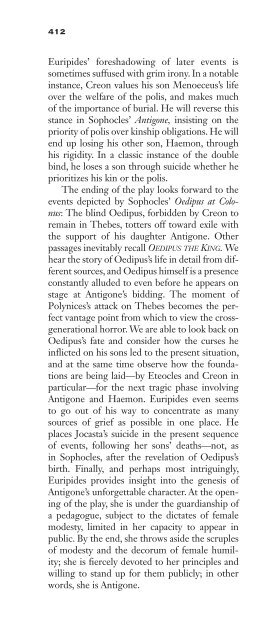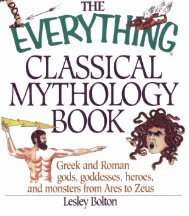Encyclopedia of Greek and Roman Mythology (Facts on File Library ...
Encyclopedia of Greek and Roman Mythology (Facts on File Library ...
Encyclopedia of Greek and Roman Mythology (Facts on File Library ...
Create successful ePaper yourself
Turn your PDF publications into a flip-book with our unique Google optimized e-Paper software.
Euripides’ foreshadowing <str<strong>on</strong>g>of</str<strong>on</strong>g> later events is<br />
sometimes suffused with grim ir<strong>on</strong>y. In a notable<br />
instance, Cre<strong>on</strong> values his s<strong>on</strong> Menoeceus’s life<br />
over the welfare <str<strong>on</strong>g>of</str<strong>on</strong>g> the polis, <str<strong>on</strong>g>and</str<strong>on</strong>g> makes much<br />
<str<strong>on</strong>g>of</str<strong>on</strong>g> the importance <str<strong>on</strong>g>of</str<strong>on</strong>g> burial. He will reverse this<br />
stance in Sophocles’ Antig<strong>on</strong>e, insisting <strong>on</strong> the<br />
priority <str<strong>on</strong>g>of</str<strong>on</strong>g> polis over kinship obligati<strong>on</strong>s. He will<br />
end up losing his other s<strong>on</strong>, Haem<strong>on</strong>, through<br />
his rigidity. In a classic instance <str<strong>on</strong>g>of</str<strong>on</strong>g> the double<br />
bind, he loses a s<strong>on</strong> through suicide whether he<br />
prioritizes his kin or the polis.<br />
The ending <str<strong>on</strong>g>of</str<strong>on</strong>g> the play looks forward to the<br />
events depicted by Sophocles’ Oedipus at Col<strong>on</strong>us:<br />
The blind Oedipus, forbidden by Cre<strong>on</strong> to<br />
remain in Thebes, totters <str<strong>on</strong>g>of</str<strong>on</strong>g>f toward exile with<br />
the support <str<strong>on</strong>g>of</str<strong>on</strong>g> his daughter Antig<strong>on</strong>e. Other<br />
passages inevitably recall oedipus tHe King. We<br />
hear the story <str<strong>on</strong>g>of</str<strong>on</strong>g> Oedipus’s life in detail from different<br />
sources, <str<strong>on</strong>g>and</str<strong>on</strong>g> Oedipus himself is a presence<br />
c<strong>on</strong>stantly alluded to even before he appears <strong>on</strong><br />
stage at Antig<strong>on</strong>e’s bidding. The moment <str<strong>on</strong>g>of</str<strong>on</strong>g><br />
Polynices’s attack <strong>on</strong> Thebes becomes the perfect<br />
vantage point from which to view the crossgenerati<strong>on</strong>al<br />
horror. We are able to look back <strong>on</strong><br />
Oedipus’s fate <str<strong>on</strong>g>and</str<strong>on</strong>g> c<strong>on</strong>sider how the curses he<br />
inflicted <strong>on</strong> his s<strong>on</strong>s led to the present situati<strong>on</strong>,<br />
<str<strong>on</strong>g>and</str<strong>on</strong>g> at the same time observe how the foundati<strong>on</strong>s<br />
are being laid—by Eteocles <str<strong>on</strong>g>and</str<strong>on</strong>g> Cre<strong>on</strong> in<br />
particular—for the next tragic phase involving<br />
Antig<strong>on</strong>e <str<strong>on</strong>g>and</str<strong>on</strong>g> Haem<strong>on</strong>. Euripides even seems<br />
to go out <str<strong>on</strong>g>of</str<strong>on</strong>g> his way to c<strong>on</strong>centrate as many<br />
sources <str<strong>on</strong>g>of</str<strong>on</strong>g> grief as possible in <strong>on</strong>e place. He<br />
places Jocasta’s suicide in the present sequence<br />
<str<strong>on</strong>g>of</str<strong>on</strong>g> events, following her s<strong>on</strong>s’ deaths—not, as<br />
in Sophocles, after the revelati<strong>on</strong> <str<strong>on</strong>g>of</str<strong>on</strong>g> Oedipus’s<br />
birth. Finally, <str<strong>on</strong>g>and</str<strong>on</strong>g> perhaps most intriguingly,<br />
Euripides provides insight into the genesis <str<strong>on</strong>g>of</str<strong>on</strong>g><br />
Antig<strong>on</strong>e’s unforgettable character. At the opening<br />
<str<strong>on</strong>g>of</str<strong>on</strong>g> the play, she is under the guardianship <str<strong>on</strong>g>of</str<strong>on</strong>g><br />
a pedagogue, subject to the dictates <str<strong>on</strong>g>of</str<strong>on</strong>g> female<br />
modesty, limited in her capacity to appear in<br />
public. By the end, she throws aside the scruples<br />
<str<strong>on</strong>g>of</str<strong>on</strong>g> modesty <str<strong>on</strong>g>and</str<strong>on</strong>g> the decorum <str<strong>on</strong>g>of</str<strong>on</strong>g> female humility;<br />
she is fiercely devoted to her principles <str<strong>on</strong>g>and</str<strong>on</strong>g><br />
willing to st<str<strong>on</strong>g>and</str<strong>on</strong>g> up for them publicly; in other<br />
words, she is Antig<strong>on</strong>e.<br />
Phoenician Women<br />
If Oedipus the King comes closest <str<strong>on</strong>g>of</str<strong>on</strong>g> any<br />
<str<strong>on</strong>g>Greek</str<strong>on</strong>g> tragedy to satisfying the Aristotelian<br />
criteria <str<strong>on</strong>g>of</str<strong>on</strong>g> complete acti<strong>on</strong>, Euripides goes to<br />
the other extreme <str<strong>on</strong>g>of</str<strong>on</strong>g> a purposely decentered<br />
<str<strong>on</strong>g>and</str<strong>on</strong>g> structurally diffuse tragic panorama. As in<br />
other Euripidean plays, grief is piled <strong>on</strong> grief<br />
in l<strong>on</strong>g successi<strong>on</strong>, <str<strong>on</strong>g>and</str<strong>on</strong>g> we are left to c<strong>on</strong>template<br />
the cruelty <str<strong>on</strong>g>of</str<strong>on</strong>g> fate <str<strong>on</strong>g>and</str<strong>on</strong>g> the apparent<br />
indifference <str<strong>on</strong>g>of</str<strong>on</strong>g> the gods. More than <strong>on</strong>e messenger<br />
scene is required to narrate this string<br />
<str<strong>on</strong>g>of</str<strong>on</strong>g> deaths. Euripides does not make an effort to<br />
set up an all-important moment <str<strong>on</strong>g>of</str<strong>on</strong>g> decisi<strong>on</strong> for<br />
the tragic hero; there is no true, central tragic<br />
hero in this play, but <strong>on</strong>ly a l<strong>on</strong>g string <str<strong>on</strong>g>of</str<strong>on</strong>g> victims<br />
<str<strong>on</strong>g>of</str<strong>on</strong>g> fate. The outcomes seem predestined.<br />
Polynices’s <str<strong>on</strong>g>and</str<strong>on</strong>g> Eteocles’ mutual slaughter is<br />
amply prepared for in the preceding scenes,<br />
<str<strong>on</strong>g>and</str<strong>on</strong>g> as tragic spectators, we have the feeling <str<strong>on</strong>g>of</str<strong>on</strong>g><br />
going through the moti<strong>on</strong>s <str<strong>on</strong>g>of</str<strong>on</strong>g> a fait accompli.<br />
Menoeceus decides instantaneously <strong>on</strong> suicide.<br />
The <strong>on</strong>ly work he must do (which he does easily)<br />
is deceive his father as to his intenti<strong>on</strong>s.<br />
This sense <str<strong>on</strong>g>of</str<strong>on</strong>g> weariness <str<strong>on</strong>g>and</str<strong>on</strong>g> exhausted<br />
expectati<strong>on</strong> <str<strong>on</strong>g>of</str<strong>on</strong>g> the next inevitable mishap<br />
extends to the point <str<strong>on</strong>g>of</str<strong>on</strong>g> mild humor. Cre<strong>on</strong><br />
summ<strong>on</strong>s Tiresias as a sort <str<strong>on</strong>g>of</str<strong>on</strong>g> afterthought, as<br />
if summ<strong>on</strong>ing him is routine, the sort <str<strong>on</strong>g>of</str<strong>on</strong>g> thing<br />
<strong>on</strong>e always does in a Theban tragedy. Tiresias<br />
hobbles <strong>on</strong>stage with a certain self-c<strong>on</strong>sciousness<br />
regarding his own character as physically<br />
debilitated but prophetically accurate seer.<br />
When he leaves the scene, he grumbles <str<strong>on</strong>g>and</str<strong>on</strong>g><br />
grouches about the mistreatment <str<strong>on</strong>g>of</str<strong>on</strong>g> prophets<br />
such as himself. No <strong>on</strong>e ever listens to Tiresias,<br />
<str<strong>on</strong>g>and</str<strong>on</strong>g> the c<strong>on</strong>sequences are always grim—no<br />
matter how many tragedies he appears in, <str<strong>on</strong>g>and</str<strong>on</strong>g><br />
no matter how <str<strong>on</strong>g>of</str<strong>on</strong>g>ten he is proven right.<br />
The Chorus <str<strong>on</strong>g>of</str<strong>on</strong>g> Phoenician women who<br />
views <str<strong>on</strong>g>and</str<strong>on</strong>g> comments <strong>on</strong> this tragedy as it<br />
unfolds is exiled from its homel<str<strong>on</strong>g>and</str<strong>on</strong>g> <str<strong>on</strong>g>and</str<strong>on</strong>g> thus in<br />
a positi<strong>on</strong> to appreciate some <str<strong>on</strong>g>of</str<strong>on</strong>g> the play’s key<br />
themes (both Polynices <str<strong>on</strong>g>and</str<strong>on</strong>g> Oedipus are exiles).<br />
It identifies with the Theban community, with<br />
whom it has shared ancestors, but at times, it<br />
also enunciates its difference: It is at <strong>on</strong>ce foreign<br />
<str<strong>on</strong>g>and</str<strong>on</strong>g> yet somehow part <str<strong>on</strong>g>of</str<strong>on</strong>g> the community.







